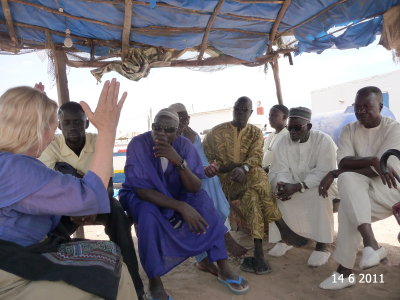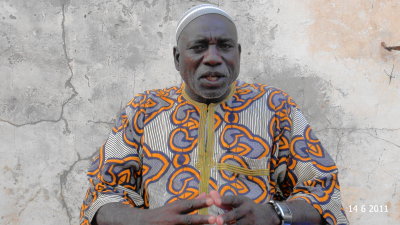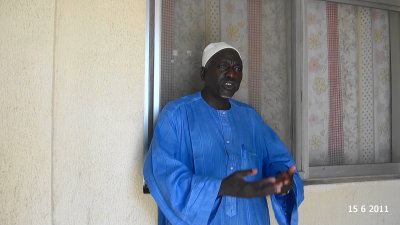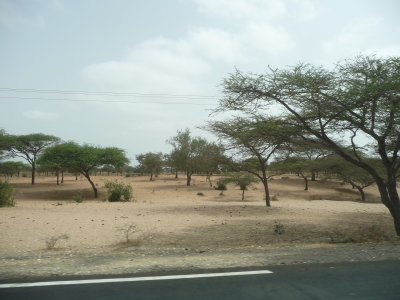Meeting the President of the artisanal fishermen in Senegal, Kayar
We went Tuesday, June 14, 2011 to Kayar, a traditional fishing village. We have been received by Abdoulaye Gueye DIOP, President of the National Union of Artisanal Fishermen (CNPS) in Senegal.
 Abdoulaye Gueye DIOP immediately took us to meet the old fishermen with whom we had a pleasant and fruitful discussion about the project objectives and the interest they bear in Mare Nostrum.
Abdoulaye Gueye DIOP immediately took us to meet the old fishermen with whom we had a pleasant and fruitful discussion about the project objectives and the interest they bear in Mare Nostrum.
An interview was then sought and was an opportunity for us to have a first clear picture of the situation of the fisheries in Kayar and the role that fishermen and other industry leaders play as well as the activities they develop.
Abdoulaye Gueye DIOP begins by noting that the village of Kayar is taken as a reference among all the fishing villages due to the very responsible way in which the fishing activity is organised. Evidence of this conduct is the prohibition by the fishermen of the locality on fishing with monofilament nets (mbalou thiass).
 They have even come to serious trouble with the fishermen of Guet-Ndar, another community fishermen living in northern Senegal. It was at the end of these tough fights that the State has issued a decree to prohibit this type of fishing as incompatible with proper management of marine resources. We also note in support of this argument the formal order that line fishermen may not land more than three boxes of fish at a time and purse seine fishermen can not make more than one run per day. The fishermen of Kayar are very respectful to this order. These measures, although indications of the noble concern of Kayar's population for the management of marine resources, also reflect the great difficulties facing those involved in fisheries in general, fishermen in particular. Among these difficulties we may mention:
They have even come to serious trouble with the fishermen of Guet-Ndar, another community fishermen living in northern Senegal. It was at the end of these tough fights that the State has issued a decree to prohibit this type of fishing as incompatible with proper management of marine resources. We also note in support of this argument the formal order that line fishermen may not land more than three boxes of fish at a time and purse seine fishermen can not make more than one run per day. The fishermen of Kayar are very respectful to this order. These measures, although indications of the noble concern of Kayar's population for the management of marine resources, also reflect the great difficulties facing those involved in fisheries in general, fishermen in particular. Among these difficulties we may mention:
-
The limitation of fish landings is a consequence of the lack of conservation means, namely also cold stores.
-
The fisheries agreements signed by the State do not help the effective management of resources. The fishermen say that fish is scarce and not enough for the Senegalese. Therefore, it seems foolish that their government allows foreigners to fish in Senegalese waters. A day without fishing was organised to protest against this and the press conference organised by the CNPS in May 2011 in Dakar was a fresh opportunity for small-scale fishermen to denounce these decisions implemented against their interests.
-
The lack of enforcement by the government of regulations imposed on the practice of fishing. The fishermen play their part perfectly, though the state remains inert and continues to show indifference to the problems of a sector that weighs heavily in the economy of this country.
 He also expresses a concern in relation to a specific situation in their locality. Kayar is indeed an area where fishing and agriculture are practiced to approximately equal degrees.
He also expresses a concern in relation to a specific situation in their locality. Kayar is indeed an area where fishing and agriculture are practiced to approximately equal degrees.
The concern is associated with the fear that their village could lose its classification as traditional fishing village, if the fishery would no more pull its weight and that agriculture is seen and taken as a good alternative. Many facts point in this direction:
-
The deplorable condition of the fishermen, when they are no longer able to practice, and the fact that their heirs are not well motivated to continue the activity.
-
 The depletion of fish combined with very low capacity of the locality to ensure comprehensive education of the children is an indication for a possible dominance of agriculture as main activity of Kayar, thereby losing its capacity as traditional fishing village - a village where fishing is just a lucrative business, but no longer rather a system, a system where every part of the population is aware of the role it must play for its sustainability.
The depletion of fish combined with very low capacity of the locality to ensure comprehensive education of the children is an indication for a possible dominance of agriculture as main activity of Kayar, thereby losing its capacity as traditional fishing village - a village where fishing is just a lucrative business, but no longer rather a system, a system where every part of the population is aware of the role it must play for its sustainability.
The fishermen demand that the State gets down to more concrete accomplishments and does not spend huge sums of money on seminars, after which their situation does not improve even a jota. Abdoulaye Gueye DIOP also calls for an initiative and its support so that fishermen enjoy social security. He ends the interview by calling on all small-scale fishermen to unite so that all the objectives of the CNPS are achieved, namely improving the living conditions of fishermen and working towards better management of marine resources.








